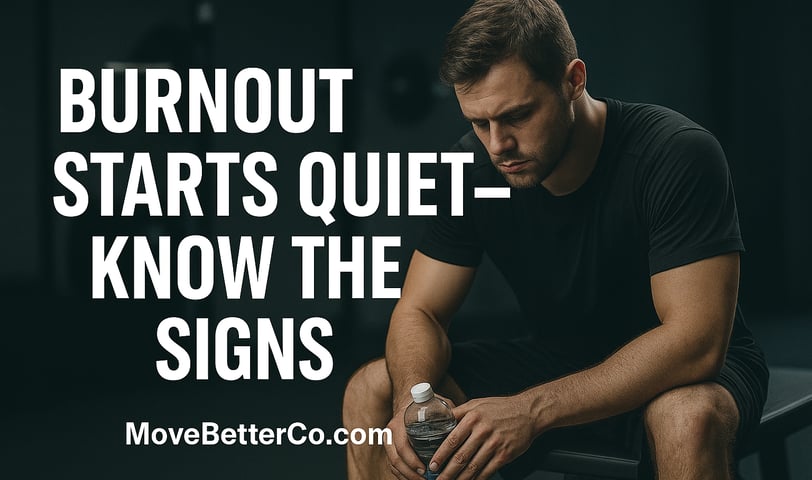Recognizing Early Signs of Overtraining and Burnout: What Every Athlete Needs to Know
Overtraining and burnout can sneak up on even the most dedicated athletes. Learn how to spot the warning signs early, backed by science, personal stories, and recovery strategies that actually work.
6/1/20252 min read


Recognizing Early Signs of Overtraining and Burnout
In the relentless pursuit of peak performance, athletes often walk a fine line between optimal training and overtraining. While dedication is commendable, pushing beyond the body's capacity to recover can lead to overtraining syndrome and burnout, jeopardizing both physical health and mental well-being.
Understanding Overtraining and Burnout
Overtraining syndrome (OTS) occurs when the balance between training stress and recovery is disrupted. Instead of improving, performance plateaus or declines, accompanied by physiological and psychological symptoms. Burnout, on the other hand, is a state of emotional, physical, and mental exhaustion caused by prolonged stress, often leading to reduced motivation and withdrawal from the sport.
Early Warning Signs
Recognizing the early signs is crucial:
Persistent Fatigue: Feeling unusually tired during or after workouts, despite adequate rest.
Declining Performance: Notable drops in strength, endurance, or skill execution.
Mood Changes: Increased irritability, depression, or anxiety.
Sleep Disturbances: Trouble falling asleep or staying asleep.
Appetite Changes: Loss of appetite or unusual cravings.
Frequent Illnesses: Increased susceptibility to colds or infections.
Elevated Resting Heart Rate: A consistently higher morning heart rate can indicate stress.
Monitoring your resting heart rate can be facilitated by using devices like the COROS Heart Rate Monitor, which provides accurate and continuous heart rate data.Amazon+1TechRadar+1
Personal Stories: The Human Side of Burnout
Gabby Thomas, an Olympic sprinter, experienced burnout during her collegiate career. She took a semester abroad to regain balance, which rejuvenated her passion and performance.
Arno Kamminga, a Dutch swimmer, faced severe burnout after contracting COVID-19. He reduced his training drastically to recover, highlighting the importance of listening to one's body. Amazon
Contributing Factors
Several factors can contribute to overtraining and burnout:
Lack of Recovery: Insufficient rest between intense training sessions.
Monotonous Training: Repetitive routines without variation.
External Pressures: Expectations from coaches, parents, or oneself.
Early Specialization: Focusing on one sport from a young age without diversification.
Poor Nutrition: Inadequate fueling impairs recovery and performance. Amazon
Incorporating recovery tools, such as the R4™ Body Roller, can aid in muscle relaxation and prevent overuse injuries.
Preventive Measures
To mitigate the risk:
Implement Periodization: Vary training intensity and volume over time.
Prioritize Sleep: Aim for 7-9 hours of quality sleep per night.
Monitor Training Load: Use tools or journals to track intensity and volume.
Encourage Open Communication: Foster an environment where athletes feel comfortable discussing their well-being.
Promote Multi-Sport Participation: Especially in youth, to prevent early burnout.
Tracking sleep patterns can be enhanced with devices like the Oura Ring Gen3, which provides detailed insights into sleep quality and recovery.
Recovery Strategies
If signs of overtraining or burnout appear:
Rest: Take time off from training to allow the body and mind to recover.
Seek Professional Help: Consult with healthcare providers or sports psychologists.
Adjust Goals: Reevaluate and set realistic, achievable objectives.
Incorporate Relaxation Techniques: Practices like meditation or yoga can aid recovery.
Conclusion
Recognizing and addressing the early signs of overtraining and burnout is essential for long-term athletic success and health. By maintaining open communication, monitoring training loads, and prioritizing recovery, athletes can sustain performance and enjoy their sport for years to come.
FITNESS
Nutrition
WellnesS
info@movebetterco.com
© 2025. All rights reserved | Privacy Policy | Terms & Conditions